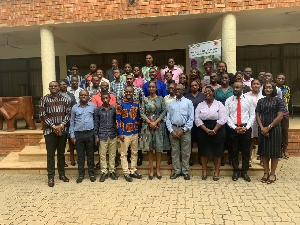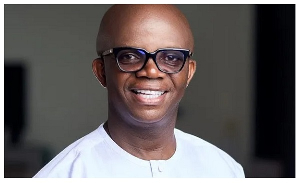The Ghana component of a research conducted by the Partnership for African Social and Governance Research (PASGR) has found limited financial capital and lack of social and political connections as key constraints to youth in the country meeting their economic aspirations.
Dubbed "Economic Aspirations of Ghanaian Youth; Implications for Youth Employment Policies and Programmes in the Post-COVID-19 Era," the research replicated across five other African countries sought to understand the aspirations of African youth as well as their resilience and strategies adopted to pursue their aspirations in the face of militating policy, pandemic, and other challenging environments.
Among other things, the research found the economic aspirations of Ghanaian youth and the youth of Africa to revolve around three key issues. The issues include the aspiration of African youth to establish their own businesses, combine formal employment with entrepreneurship, and accumulate wealth.
“Out of 1639 young men and women interviewed across the country, the majority indicated that they would like to venture into business (60.2%) as part of their economic aspirations in a post-COVID-19 era. This finding is consistent across both young men (60.3%) and young women (60.1%) in both rural and urban areas. Their desires of wanting to establish their own businesses in the future are probably a reflection of growing disappointment of the youth regarding their inability to secure permanent jobs either in the public or private sector following graduation from school. Gender differences emerged in the type of businesses that the youth would like to establish. On the one hand, the young men spoke more of establishing businesses along the agricultural value chain such as livestock production and agricultural plantation, as well as fuel stations, trade in spare parts and construction materials. On the other hand, the young women aspired to establish multiple businesses that are traditionally open to women in society.
“Their occupational aspirations included becoming beautician, seamstress, and engaging in trade in agricultural and household appliances. The youth emphasized the importance of securing financial support realizing their economic aspiration of becoming entrepreneurs,” the research found.
The research also found that about 25.7% of respondents wish to combine formal employment with business.
“Thus, in addition to self-employment, they placed a high degree of importance on securing professional or salaried employment in fields such as computer science, politics, engineering, banking, nursing, medicine among others. According to them, these jobs are well-paid, prestigious, command respect, and provide good income and financial stability.”
On wealth accumulation, the research found that young men and women across Ghana aspire to accumulate wealth as part of their economic aspirations.
According to the finding, the desire of young Ghanaians to accumulate wealth in the form of money, residential plots, buildings, and household items is not necessarily due to their own needs but to ensure that they are better placed to take care of their family members.
On what serves as a hindrance to the economic aspirations of Ghanaian youth, the research found that lack of money or starting capital is a major barrier. Also, lack of political and social connections was cited by respondents as another hindrance.
“A majority of both the young women (72.8%) and young men (68.5%) who participated in the study reported lack of money/starting capital as a major barrier to realizing their economic aspirations. As noted earlier, many youths aspire to own businesses in the future, and a key resource needed is financial capital which many of them recognize as a major challenge. There is a consensus among young men and women that financial capital is the major constraint inhibiting today's youth from realizing their entrepreneurial dreams.
“Moreover, lack of political and social connections was cited by the youth as key challenges. The youth interviewed explained that it was difficult for any young man or woman to secure employment or benefit from government programs that offer business grants or loans to entrepreneurs without political or social connections,” the research found.
Funded by the MasterCard Foundation, the research carried out between March 2021 and December 2023, was replicated across other African countries including Kenya, Ghana, Senegal, Ethiopia, Uganda, and Nigeria.
Speaking at a programme to present the research findings on March 20, 2024, in Accra, the African Youth Resilience and Aspirations Project Coordinator, Joel Otieno, emphasized that the research findings will go a long way to help policymakers as well as youth empowerment organizations tailor appropriate solutions to issues affecting the youth on the continent.
“One of the major findings that we have gotten from the research is that the majority of the youth are interested in starting and owning their own businesses. With that in mind alone, we see that most people are looking at opportunities that can become their own bosses and also where they can have full control of what they do and the activities that they take.
“In terms of policy, it is how can we then create enough opportunities or provide enough incentives for young people to own their own businesses and ventures. In a way of improving their livelihoods and well-being and this is important as a policy recommendation. Other policy recommendations are to find opportunities for supporting young people financially in accessing financial capital, building their own opportunities in terms of how the business environment is favoring them and also other avenues in which young people can be supported and mentored,” he said.
Watch the latest edition of BizHeadlines below:
Ghana’s leading digital news platform, GhanaWeb, in conjunction with the Korle-Bu Teaching Hospital, is embarking on an aggressive campaign which is geared towards ensuring that parliament passes comprehensive legislation to guide organ harvesting, organ donation, and organ transplantation in the country.
Click here to follow the GhanaWeb Business WhatsApp channel
Business News of Friday, 22 March 2024
Source: www.ghanaweb.com
Financial capital, lack of political and social connections constraining economic aspirations – Research
Entertainment
















